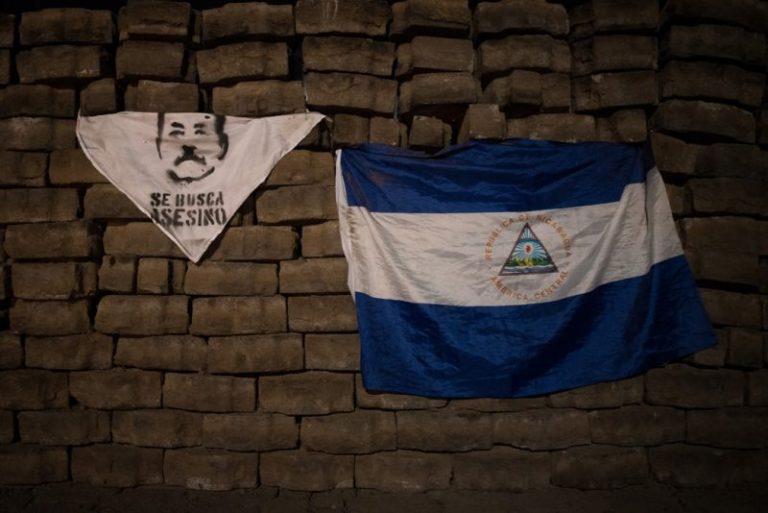13 de mayo 2020

Children of Exile: The Births “Sowing Hope” in the Camp of Nicaraguan Farmers

PUBLICIDAD 1M
PUBLICIDAD 4D
PUBLICIDAD 5D
The pandemic finds us already under siege from that other disease: fear, and the insecurity that surrounds our lives and threatens our freedom

The pandemic finds us already under siege from that other disease: fear
There are constant posts on social media from those who rail against the organizations of civil society or public figures, demanding that they abstain from “desktop” communiques and condemnations of the regime. “Do something!”; “They’re not doing anything!”; “Stop talking!”, they insist.
It’s true that living in this country under a regime that, in addition to repressive, seems ever more incapable of taking charge of the country’s problems can easily lead one to desperation.
The Covid-19 epidemic, with the [government] policies of agglomerations, of misinformation, of ignoring the problem and trying to convince the population that everything’s fine and that they’re victims of the opposition’s “fake news”, is now claiming a high price. It’s very difficult in Nicaragua to hide an illness that has begun to have more victims every day. We’re not a quiet or discreet society. “The sobbing proclaims what fear denies,” and such weeping is ever more extensive.
The pandemic adds to an accumulation of errors and absurdities that have been pushing us to the wall. “I can’t breathe”, the last words of Alvarito Conrado [fifteen-year-old shot and killed, presumably by government forces fire, during the first days of the April 2018 protests] were a premonition of the situation we find ourselves in.
We’re prisoners of our own mortal terror of a couple that have found no better response to their panic over losing power than to turn their fear into weapons. They’ve projected their fear in every possible way, assuring that we all were infected. The pandemic, then, has found us under siege from that other disease: fear, and the insecurity that surrounds our lives and threatens our freedom.
“Everyone is the owner of their own fear,” said Pedro Joaquin Chamorro when asked [in the 70s] if he feared that the Somoza dictatorship might kill him. In our case, as a nation, we can ask ourselves: Are we guilty of our own fear? A country that has lived through two wars with thousands of deaths, a recent killing spree against an unarmed rebellion, hundreds of prisoners and [so many] exiles, in addition to earthquakes, hurricanes, fires and mudslides, doesn’t lack courage, but has learned to put greater value on their lives.
The psychological warfare, the kidnappings, the imprisonments, the daily sieges, the threats, the removals from jobs or positions are a minefield for citizen action. The normal response is to protect your life. The other response would be armed struggle. Fortunately, this second option has been rejected. To raise arms against a dictatorship requires a long, costly and bloody process, and Nicaragua knows this from experience, just as they know that this option doesn’t necessarily result in the aspired democracy and freedom.
Thus, the work done by the organizations of civil society – constant denunciations, the demands issued, the international work – shouldn’t be seen as useless or inadequate forms of resistance. From April 2018 to the present, tireless and stubborn efforts have been made to keep alive the flame of memory and of hope.
Hundreds of people, from the independent media to the non-governmental organizations in our country, are working day by day to not let the regime rest; to point out their derangement; and to bury that omnipotent power flaunted by their paramilitary, police, deputies, as well as the official media and the servile peons within the state. That chorus, that collective shout, is nothing to be scorned.
Full awareness of what’s happening is the central pillar on which the spirit of struggle is born and rests. It’s what feeds the desire for justice and the holy rage of a people. Without these tasks of recalling the crimes committed, of denouncing the conditions of the political prisoners, of making sure the world can see what’s going on and isolate the regime; of posting alerts about their abductions, besiegement and now on about their concealment of the pandemic and its consequences, we’d have been castrated, rendered useless.
We have the use of these weapons and we’re using them at full force. Such battle trenches are not in any way pitiful. To appreciate the efforts being made, not undermine them; to produce ideas, not ignite rivalries; to unite, not confront would be a considerable contribution. We’re a country of imperfect people, children of a disastrous political culture.
The “new” democracy involves respecting differences. It involves pointing out errors in order to build the war against the regime, not derail it and turn it against ourselves. In order to conquer liberty for all, the first freedom is to free ourselves of the prejudices and intolerance that prolong the moment when we can become one solid fist to strike at the regime’s iniquity.
Archivado como:
PUBLICIDAD 3M
Poeta y novelista nicaragüense. Ha publicado quince libros de poemas, ocho novelas, dos libros de ensayos, una memoria, y cuatro cuentos para niños. Su primera novela “La mujer habitada” (1988) ha sido traducida a más de catorce idiomas. Ganadora del Premio La Otra Orilla, 2010; Biblioteca Breve, de Seix Barral (España, 2008); Premio Casa de las Américas, en Cuba; Premio Internacional de Poesía Generación del ‘27, en España y Premio Anna Seghers de la Academia de Artes, de Alemania; Premio de Bellas Artes de Francia, 2014. En 2023 obtuvo el premio Reina Sofía de Poesía Iberoamericana, el más prestigioso para la poesía en español. Por sus posiciones críticas al Gobierno de Daniel Ortega y Rosario Murillo, fue despatriada y confiscada. Está exiliada en Madrid.
PUBLICIDAD 3D